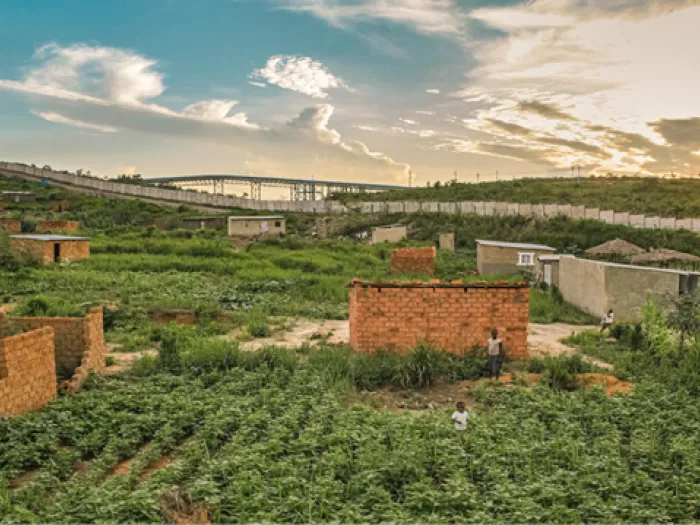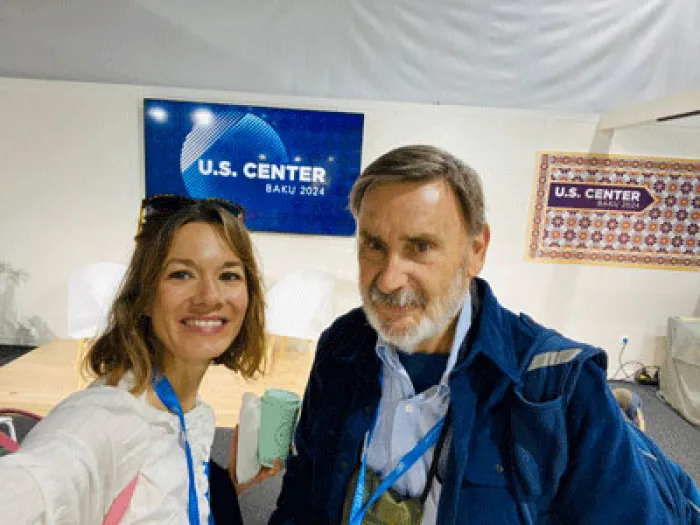Presbyterians for Earth Care webinar features well-traveled observers of climate change and migration
The Rev. Gregg Brekke and Andrew Kang Bartlett share the insights that travel has helped to reveal


LOUISVILLE — A webinar put on last week by Presbyterians for Earth Care featured the travels and insights provided by two men reporting on the effects that climate change is having on migration. Watch the 69-minute webinar featuring journalist the Rev. Gregg Brekke, the former editor of Presbyterian News Service, and Andrew Kang Bartlett, the Presbyterian Hunger Program’s Associate for National Hunger Concerns, by clicking here.
More than 20 years ago, Brekke visited the Nogales, Arizona, area along the Borderlands. “I was struck by how difficult it was for people to move” as they were seeking economic opportunity, especially farming opportunity, in central Mexico, he said. He since has traveled to more than 55 countries, “working with different organizations in places that were experiencing climate disasters or climate-related themes,” Brekke said. In his work, “it’s important to see how and why people are moving and relate that to the family context.”
At about 280 million people, the global migrant population includes more than 32 million people internally displaced due to climate-related issues, Brekke said. Within the United States, 3.2 million people have been internally displaced and have relocated due to climate considerations in the last decade. “The movement tends to go toward coastal places, which have also faced climate-related disasters,” Brekke said.
Most news articles “portray migrants as issues rather than people,” Brekke said. “Reporters are only now beginning to ask questions that would shed light on climate migration.”
Learn more from Brekke’s presentation to PEC here.
He closed his talk with this quote from Amali Tower, founder and executive director of Climate Refugees: “We’ve got to approach climate displacement as a human security issue and not a border security issue.”
“I have the pleasure of bringing you a little of the good news,” said Kang Bartlett. One recent bit of good news is the reforestation of Ekvn-Yefolecv, the Maskoke eco-village in Alabama, told here and here. Kang Bartlett’s slide presentation is here.
“It is an intentional community to revitalize their lifeways on ancestral lands in rural Alabama,” Kang Bartlett explained. Fundraising has led to acquiring 4,000 acres of endangered forest that was to have been used for graphite mining.
“They do amazing green building. They bless trees before they fell them,” Kang Bartlett said of the Maskoke. Living off of the grid, the Maskoke derive most of their energy from geothermal and solar sources.
Native Alaskans are being hit as hard as anyone by climate change, Kang Bartlett noted. “Melting sea ice compromises their hunting and foraging,” he said. “It is hard on community cohesion.”
Kang Bartlett touched on the work of Nenana Land Back and Calypso Farm near Fairbanks, which purchased about 80 acres for $80,000. The goal, he said, is “to show tribes how young people can be trained to acquire old skills.”
“Indigenous people are defenders of bio-diversity and the climate,” Kang Bartlett said, but they’re “often excluded from climate policy discussions and from places of advocacy.”
In Minnesota, the Presbyterian Tree Fund is helping the Forest Assisted Migration Project to bring new tree species from southern locales to adapt to climate change in the North Star State.
Kang Bartlett also closed with a quote, this from Erich Fromm in “The Art of Loving”: “The principle underlying capitalistic society and the principle of love are incompatible.”
Presbyterians for Earth Care’s next webinar, set for 7 p.m. Eastern Time on Jan. 26, is on the Presbyterian Women/Horizons Bible Study, “Let Justice Roll Down: God’s Call to Care for Neighbors and All Creation.” The author of the study, Dr. Patricia K. Tull, will be the special guest. Learn more here.
You may freely reuse and distribute this article in its entirety for non-commercial purposes in any medium. Please include author attribution, photography credits, and a link to the original article. This work is licensed under a Creative Commons Attribution-NonCommercial-NoDeratives 4.0 International License.



